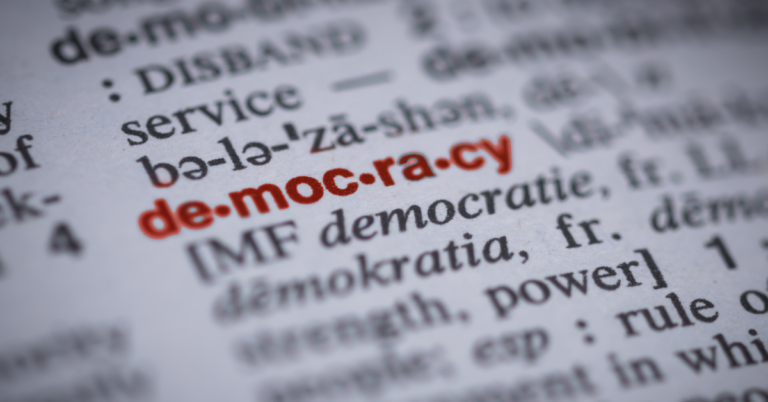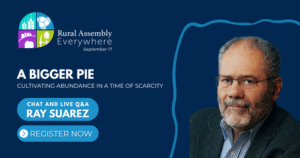How to strengthen democracy in your community in 2022

How do we work to secure and strengthen our democracy within our own communities?
Throughout the past year, the Rural Assembly spoke with rural and national leaders across the country about what strengthens our democracy and what weakens it. We talked about local leadership; voting rights; equitable investment in civic infrastructure; access to services, opportunity, and quality journalism.
We learned that democracy is the sum of many parts, and it is lived experience, first and foremost.
As we consider democracy and the legacy of Jan. 6, we’re returning to the wisdom of these leaders for immediate and meaningful steps we can take today to return to the sum of us.
Build Relationships
Nothing gets done without a relationship, said Nema Brewer, co-founder of Kentucky 120, a public education advocacy group in Kentucky, during a discussion at Rural Women Everywhere in October 2021.
She stressed the importance of building relationships with people on your local school boards — both finding common ground and also holding them accountable.
“I believe nothing gets done unless you have a relationship. That might mean crossing the aisle … I would get to know your board members, talk to them, don’t just bombard them immediately with demands … I think that what’s really important is if there’s a board member who is being problematic with these issues, it’s incumbent upon you to make sure this is their last term.”
Create space for those relationships to flourish
Small communities have great opportunities to create spaces for relationships to emerge, said Hahrie Han, a professor at Johns Hopkins University who specializes in the study of organizing movements, civic engagement, and democracy.
“How do you create settings where those relationships are likely to occur? When moments of disagreements come up, how do you create settings where those relationships are more likely to occur?” said Han in an Everywhere Radio podcast interview earlier this year.
In one town in Minnesota, for example, she notes that small groups of common interest, such as a church, a youth center, a school group, have built connections with another, creating a space for connection and relationship building both within their individual circles and beyond.
“Each of these groups has their own particular group of people that they’re really close to. Having each of those groups have their own independence, but also be connected to each other and be interacting in this interdependent way means that people can move between a community within which they feel very safe and also a community that is much bigger than just that small, safe community,” Han said. “Having both of those things simultaneously to each other is I think what made the inclusive solidarity possible — that it wasn’t just about the interpersonal relationships people had, but it was about the nature of the opportunities that people were offered to engage with each other. Having it be both small and big at the same time in that sense was part of what made it really work.
Invest in young leaders, voters
Increasing voting access for young voters, especially those who have never voted, is a critical piece of democracy building in rural America, said the panelists on our recent discussion on the state of youth voting with the Rural Youth Catalyst Project and CIRCLE.
It requires a shift in thinking about elections, said Abby Kiesa, Deputy Director of CIRCLE.
“(It’s) shifting from thinking about mobilizing people to thinking about growing voters,” Keisa said. “Where young people matter regardless of who you think they are going to vote for or whether you think they are going to vote at all, regardless of race, family background or neighborhood.”
Focus on love of country
In 2020, political scientist Danielle Allen shared what she and her fellow researchers have been learning as they study democracy and communities. They struggled to find a phrase that forged bonds between people on different sides; patriotism appealed to those on the right; solidarity to those on the left. But one phrase seemed to connect the two: love of country.
“We have to rediscover what we mean to each other, what it means to have a commitment to one another, even across lines of political difference,” Allen emphasized. “We all need the civic courage to look our neighbors in the eye … and say “You love this country. Tell me why. I love this country, let me tell you why,” she said. “Then if we can share our stories of love, different though they may be, we can start to understand each other.
Those stories also need to include our frustrations and challenges, she noted.
“But if we can start there- with our shared love of country — I believe we can rediscover what we share more broadly,” she said.
Enjoy this post? Get more from the Rural Assembly by subscribing to our newsletters.







